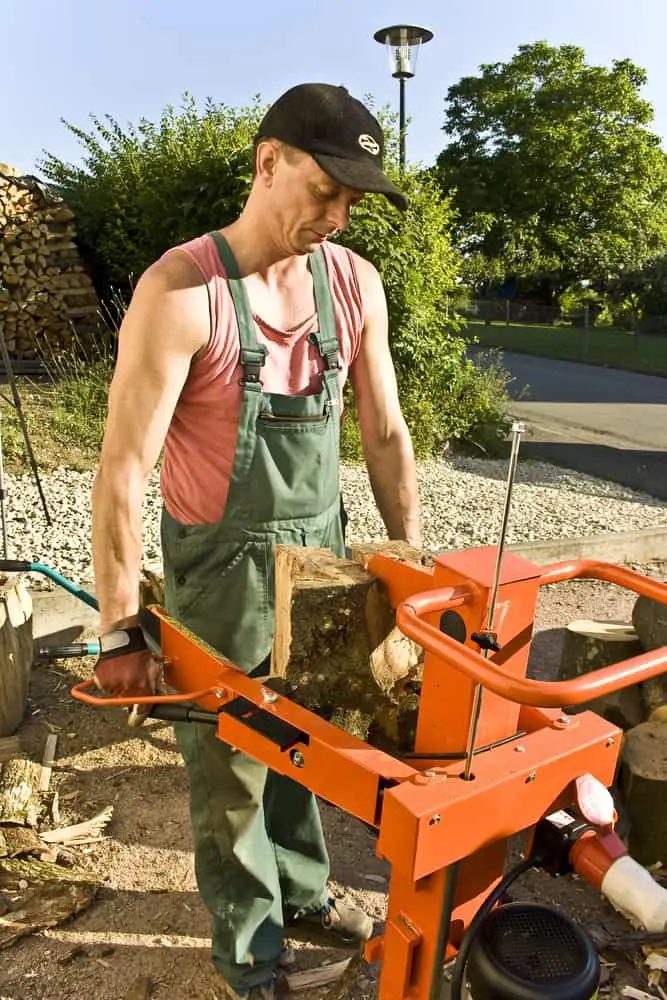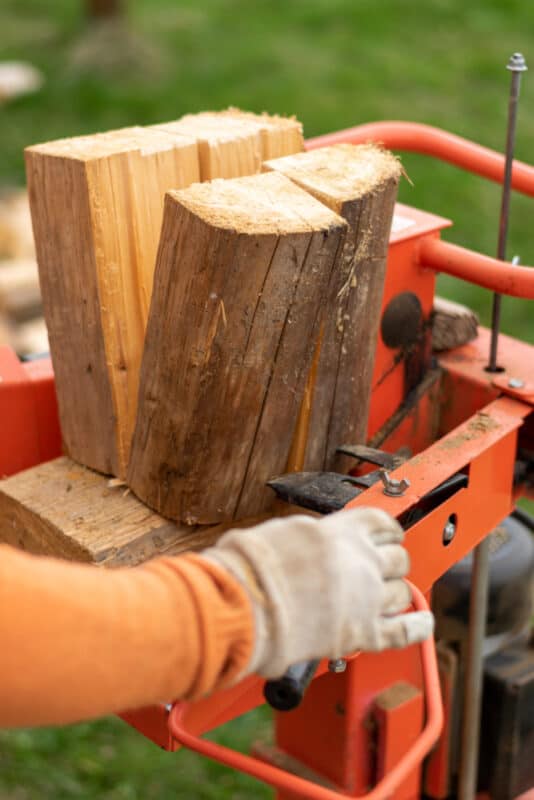Choosing between gas or electric log splitters comes down to your work.
Electric log splitters are better if you do not need as much power because they do not use gas. Gas log splitters, on the other hand, are more powerful and durable.
Log splitters have quickly become the preferred method for splitting wood.
These machines eliminate the need for manual labor and fatigue.
That said, you’ll have to choose which type you prefer first.
So, when it comes to gas or electric log splitters, which should you choose?
I want to clarify that there’s nothing wrong with using a manual log splitter or an axe. If you’re young and in good shape, either option is suitable.
This task can be pretty challenging if you have many logs and wood that require splitting.
If wood splitting serves as a source of income for you or you regularly split logs, exploring alternative methods for effectively splitting them may be advantageous.
Humans are not machines and can suffer from repetitive strain injuries.
If you can find ways to reduce stress, you’ll improve your overall well-being and have more time to enjoy life.
Let’s analyze each type of log splitter in depth to help you decide on gas or electric log splitters for your needs.

Table of Contents
Gas Log Splitters
Gas log splitters were commonly used in the past, and despite their size, they are reliable and robust.
A gas log splitter is invaluable if you work with multiple commercial properties. Using the same gasoline as other machines makes it a practical choice.
Potential buyers often avoid gas log splitters due to their heavy weight.
In reality, log splitters can weigh up to 500 pounds or more, making them difficult to move without assistance.
Related Reading: The Best Log Splitters for the Money in 2023: Maximizing Value
Electric Log Splitters
Electric log splitters are a recent addition to the market.
The machine can be connected directly to a 220W outlet instead of requiring gasoline, making it incredibly convenient.
The two main reasons that electric log splitters were originally made are:
- They offer a lightweight log splitter that doesn’t require a fuel source (other than electricity.
- They’re much quieter than gas-powered log splitters.
You may notice that electric log splitters are often compact and not bulky.
Some models even come with wheels for easy transportation. Overall, these new splitters revolutionized the industry.
If you frequently work in your backyard and are required to cut small pieces of wood, an electric log splitter is a fantastic choice for you.
It is convenient and can be easily stored in your shed after use. Just bring an extension cord the next time you need it.
Let’s check out the pros and cons of each, helping you decide on gas or electric log splitters as your preference.

Related Reading: A Beginners Guide On How To Use A Log Splitter: Log Splitting Made Easy
Pros and Cons of Gas or Electric Log Splitters
You can use both types well, but each has pros and cons.
Below, you will find the information needed to determine which is better suited for your situation so you can start chopping wood.
Gas Log Splitters
Pros
- Gas log splitters are more powerful than electric models and can handle logs over 100 pounds.
- If you opt for a gas-powered splitter, you won’t have to worry about the limitations of an electrical cord. You only need gasoline and oil, no extension cords or outlets.
- Gas log splitters are preferred in commercial properties due to their power and efficiency. Electric splitters cannot complete half of the tasks that gas splitters can.
Cons
- Gasoline-fueled log splitters are typically pricier compared to their electric counterparts. However, cheaper gasoline log splitters tend to have a shorter lifespan. This is because these log splitters have a robust motor and greater power, which makes them more costly to produce and, hence, more expensive to acquire.
- Gas log splitters are much louder than electric ones, so it’s a good idea to give your neighbors a heads-up before you turn it on.
- The weight of gas-powered log splitters can be an issue, as they often weigh over 500 pounds and can’t be easily moved, even with attached wheels.
Electric Log Splitters
Pros
- By opting for an electric log splitter, you can cut expenses by eliminating the requirement of buying gasoline every time you use it. Imagine the convenience of remaining home instead of going to the gas station each time you need to split some wood.
- The sound of an electric log splitter is much quieter than a gas log splitter. You won’t have to worry about waking everyone in the neighborhood, nor will you need professional-grade earmuffs to block out the noise.
- The overall size of an electric log splitter is small, making it easy to handle and maneuver, especially if it has wheels.
Cons
- You won’t be able to chop large wood logs with an electric splitter. They’re designed for small-to-medium logs, which can be a limitation to some potential buyers.
- The biggest and most apparent con of an electric log splitter is that you’ll always be tethered to an electrical outlet. Even if you have an extension cord, you’ll still have to watch out for it when moving around.
- Finally, electric splitters are often cheaply made. Plastic parts and low-quality metal result in a short-lived machine. You’ll have to fork over quite a bit of money to get something that lasts as long as the average gas log splitter.
Which Log Splitter is the Best for You?
To begin finding a suitable log splitter for your needs, it is helpful to consider the following questions. This will assist in navigating the challenging task of choosing gas or electric log splitters that are best for you.
If you’ve answered yes to the following questions, then you should consider buying an electric log splitter:
- Are you looking for a quiet, lightweight log splitter that can cut small pieces of wood?
- Do you need a machine to use in your backyard?
- Are you worried about buying gasoline every time you use a log splitter?
- Will you be okay with having an extension cord stretching from an outlet to the machine?
If you’ve answered yes to the following questions, then you should consider buying a gas log splitter:
- Do you need the maximum power of a log splitter?
- Do you live or work where noise isn’t a concern?
- Are you okay with buying gasoline every time you need it?
- Do you have the budget to afford a high-quality log splitter?
Both options are fantastic, but only one is meant for you. Look through the questions to determine your choice.
Consider an electric log splitter if you’re undecided. It is preferable for residential areas and logs of average size in your vicinity.
In addition to purchasing a hydraulic wood splitter, it is possible to construct your own or create a DIY log splitter.
However, doing so necessitates a certain level of mechanical and technical knowledge.
Related Reading: DIY Log Splitter Guide: How to Build Your Own for Ultimate Savings
Related Reading: Make A Hydraulic Log Splitter
Conclusion
Regularly cutting wood becomes significantly more convenient with the assistance of log splitters.
Axes often result in discomfort in the back muscle fatigue and require significant time to accomplish the task.
Technology enables us to relax while the machine handles all the tasks, yet safety measures are still necessary.
People who work on commercial properties or other professional settings would benefit from the power and durability of a gas log splitter. On the other hand, anyone who lives in the suburbs or near other people should opt for an electric log splitter.
Here are a few key points from the post:
- Gas log splitters usually cost more but have more force and power.
- Electric log splitters are lightweight, easy to move around, and they’re not as noisy.
- As long as you maintain the machines, both of them will last for many years to come.
Nothing beats sitting around a fire with logs split by you. However, you want to make splitting logs as easy and efficient as possible.
Whether you choose gas or electric log splitters will depend on your needs. Both offer benefits, so weigh the options and choose the best splitter.
Now, get out there and split some logs!
Enjoy living the outdoor life!!!
